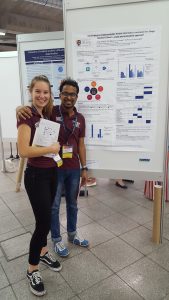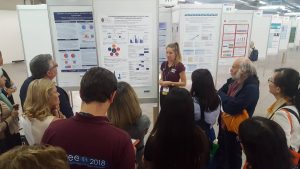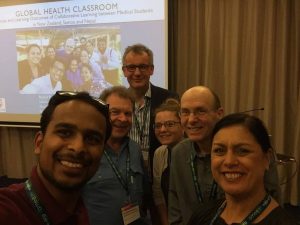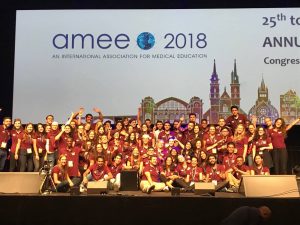Dr. Ciara Lee, PhD Student investigating uncertainty in medical education
Hi everyone,
Below is a video interview I conducted with Dr Ciara Lee in October 2018, a PhD student at Otago Medical School. Ciara discusses her project investigating how medical students interact with uncertainty during their undergraduate medical education.
Ciara Lee: ciara.lee@postgrad.otago.ac.nz
Ciara’s supervisors:
Dr Katherine Hall – katherine.hall@otago.ac.nz
Dr Megan Anakin – megan.anakin@otago.ac.nz
Associate Professor Ralph Pinnock – ralph.pinnock@otago.ac.nz
International Association for Medical Education Europe Conference: The Power to Surprise!
Basel, Switzerland
25-29 August, 2018
by Amy O’Neill and Roshit Bothara (medical students at Otago Medical School)
The International Association for Medical Education Europe (AMEE) Conference is a leading annual medical education conference uniting teachers, researchers, and students who are interested in education within the medical and healthcare professions, to present advancements and challenges in medical education. Participants are able to engage in numerous courses and workshops and network with others of similar interests. The 2018 AMEE Conference was held in the beautiful city of Basel, Switzerland from 25-29 August; with around 4000 attendees from more than 100 countries, each with different perspectives and ideas that generated boundless learning and sharing.
Roshit and I have been involved in medical education over the past year as researchers. My work has been focusing on Health Informatics (HI) in the Otago Medical School (OMS) Curriculum, and how HI is being taught in Australia, Canada and the UK, with the aim of developing an innovative HI curriculum for OMS. Roshit undertook a BMedSc (Hons) co-developing the Global Health Classroom, a global health learning model where medical students in different countries learn about each other’s healthcare system and challenges, culture and determinants of health, via video-conferencing(1).
Our involvement at AMEE was primarily as members of the Student Task Force (STF), and secondly as, presenters. The Student Task Force (STF) is a group of health profession students, selected by the AMEE committee every year, who help logistics and administration during the conference. We were honoured to be selected as part of this year’s STF which consisted of 38 students representing 40 different ethnicities. The task force was assisted by Swiss medical students, with whom we stayed at the same hostel and showed us a bit of Basel.
We also had the opportunity to be involved in a variety of workshops and seminars of our choosing and the staff engaged and valued our feedback and input as students. My poster presentation at AMEE was well received, and I was able to network with others doing similar studies in other countries. Roshit’s project was awarded the AMEE Patil Innovation Award – a massive achievement and an award with a lot of prestige in the world of medical education.
The Student Task Force exposed us to the realities in global medical education. Students from medical schools in countries such as Spain shared hugely different experiences than students in low-income countries such as Pakistan and Rwanda, and the differences in the challenges they were facing reflected this. Whether it was discussions in the hostel or within seminar groups, the more we talked about it, the more the gap became apparent. Medical schools have varying quality of curriculum design and content, and opportunities for students also greatly differ. For example, Roshit and I were two of very few students who had been financially and morally supported by their medical school to attend AMEE. Equality in medical education needs to be addressed in order for the medical profession to advance as a whole, and it is conferences such as AMEE where networking between health professionals makes goals such as this achievable.
A key learning point we took from AMEE was the capacity for change in the realm of medical education. While the quality of medical education is currently producing capable doctors, there are many ways we can enhance learning and incorporate advancing technology. In a society where technology is being used by almost everyone to look up diagnoses, take charge of health care and so much more, we need to work alongside these developments rather than against them. One example of current development in teaching is the use of virtual reality, a concept I found was brought up a lot during the conference. Being exposed to these ideas and how they are being used has shown us that they are a reality and the future of medical education.
AMEE was a once in a lifetime experience, and we have returned with a greatly broadened understanding and perspective on what medical education is and how it can be across the globe. We also engaged with educators and students from across the world and opened our eyes to the huge variation in medical education. As students we feel empowered about our role in improving the quality of medical education in New Zealand.
We are thankful to our supervisors and the Otago Medical School for supporting our attendance at AMEE.
References
- Bothara R. The Global Health Classroom: Collaborative Global Health Learning between New Zealand and Samoan Medical Students in a Virtual Classroom. Dunedin: University of Otago; 2018.
Welcome to the blog about Medical Education Research at Otago Medical School!
This blog has been newly developed and is currently under construction. This will be a space to discuss all things med ed research that is happening at OMS as well as looking at interesting research papers/developments in the field of medical education research worldwide.





